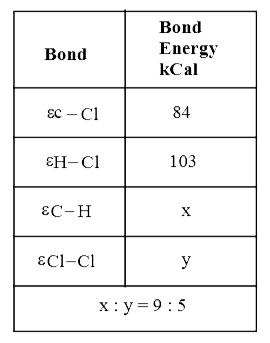Though Cl has nearly same electronegativeity as N, yet there is no H-bonding is HCl . Why ?
Chlorine atom has a large size .
Topper's Solved these Questions
- BOOK - PRADEEPCHAPTER - CHEMICAL BONDING AND MOLECULAR STRUCTUREEXERCISE - NCERT Questions And Exercises With Answers39videos
CHEMICAL BONDING AND MOLECULAR STRUCTURE
- BOOK - PRADEEPCHAPTER - CHEMICAL BONDING AND MOLECULAR STRUCTUREEXERCISE - NCERT EXAMPLAR PROBLEMS (MULTIPLE CHOICE QUESTIONS -I)22videos
CHEMICAL BONDING AND MOLECULAR STRUCTURE
- BOOK - PRADEEPCHAPTER - CHEMICAL BONDING AND MOLECULAR STRUCTUREEXERCISE - TEST YOUR GRIP (FILL IN THE BLANKS II)20videos
CHEMICAL BONDING AND MOLECULAR STRUCTURE
- BOOK - PRADEEPCHAPTER - APPENDIXEXERCISE - MODEL TEST PAPER <br> (Section C )9videos
APPENDIX
- BOOK - PRADEEPCHAPTER - CLASSIFICATION OF ELEMENTS AND PERIODICITY IN PROPERTIES EXERCISE - Competition Focus (Jee Main and Advanced / Medical Entrance ) ( Assertion - Reason Type Question ) (Type II)12videos
CLASSIFICATION OF ELEMENTS AND PERIODICITY IN PROPERTIES
Similar Questions
Give reasons for the following observations :
(i) Halogens are strong oxidising agents.
(ii) Noble gases have very low boiling points.
(iii) O and Cl have nearly same electronegativity, yet oxygen forms H bond while Cl doesn't.View SolutionAlthough nitrogen and chlorine have very nearly same electronegativity yet nitrogen forms hydrogen bonding while chlorine does not. Why?
View Solution
Knowledge Check
- Question 1 - Select One
Positron has nearly the same mass as that of:
Aα-particleBProtonsCNeutronDElectron - Question 2 - Select One
The reaction CH4(g)+Cl2(g)→CH3Cl(g)→HCl(g) has ΔH=−25kCal .

From the given data , what is the bond energy of Cl – Cl bondA70 kCalB80 kCalC67.75 kCalD57.75 kCal
Although nitrogen and chlorine have very nearly same electronegativity yet nitrogen forms hydrogen bonding while chlorine does not. Why?
View SolutionAlthough chlorine and oxygen have nearly same electronegativity yet only oxygen from hydrogen bond explain it ?
View SolutionExplain why in spite of nearly the same electronegativity, oxygen forms hydrogen bonding while chlorine does not.
View SolutionExplain why inspite of nearly the same electronegativity, oxygen forms hydrogen bonding while chlorine does not.
View SolutionExplain why inspite of nearly the same electronegativity, oxygen forms hydrogen bonding while chlorine does not.
View SolutionN and Cl have same electronegativily. Whereas hydrogen bonding is present in the molecules of NH3, it is absent at the sometime in HCl molecules. Explain.
View Solution

